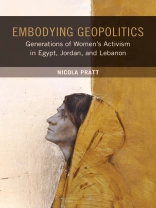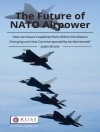When women took to the streets during the mass protests of the Arab Spring, the subject of feminism in the Middle East and North Africa returned to the international spotlight. In the subsequent years, countless commentators treated the region’s gender inequality as a consequence of fundamentally cultural or religious problems. In so doing, they overlooked the specifically political nature of these women’s activism. Moving beyond such culturalist accounts, this book turns to the relations of power in regional and international politics to understand women’s struggles for their rights.
Based on over a hundred extensive personal narratives from women of different generations in Egypt, Jordan, and Lebanon, Nicola Pratt traces women’s activism from national independence through to the Arab uprisings, arguing that activist women are critical geopolitical actors. Weaving together these personal accounts with the ongoing legacies of colonialism, Embodying Geopolitics demonstrates how the production and regulation of gender is integrally bound up with the exercise and organization of geopolitical power, with consequences for women’s activism and its effects.
Table of Content
Acknowledgments
Abbreviations
Introduction: Embodying Geopolitics in the Middle East and North Africa
1 • Female Respectability and Embodied National Sovereignty
2 • The 1967 Defeat and Its Aftermath: The Breakdown of the Gender Order and the Expansion of Women’s Activism
3 • The Gendered Effects of Political Repression and Violence in the 1970s and 1980s
4 • The Political Economy and Geopolitics of Women’s Activism after the Cold War
5 • Women’s Rights as Geopolitical Discourse: The Struggle over Geography in the Post–Cold War Period
6 • The Struggle over Gender at the Heart of the Arab Uprisings
7 • The Gendered Geopolitics of Fear and Counterrevolution
Conclusion
Notes
List of Interviewees
List of Organizations
References
Index
About the author
Nicola Pratt is Associate Professor of International Politics of the Middle East at the University of Warwick. She is the coauthor of What Kind of Liberation? Women and the Occupation of Iraq and author of Democracy and Authoritarianism in the Arab World.












